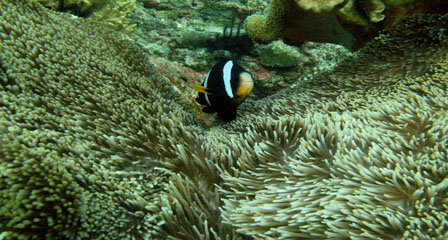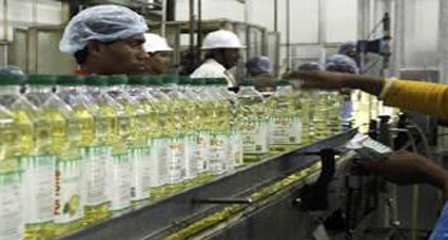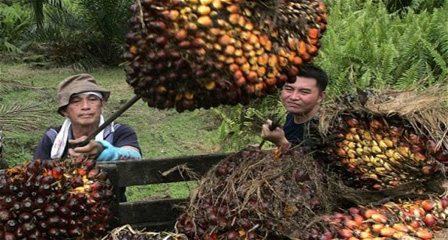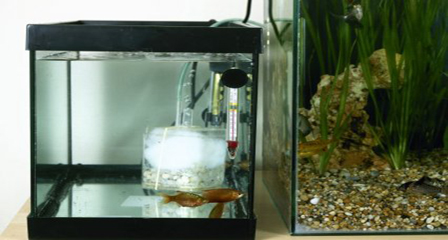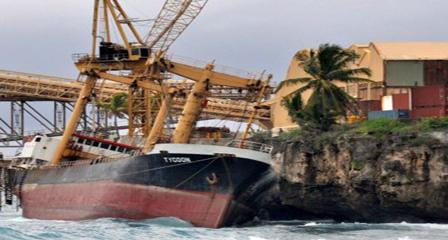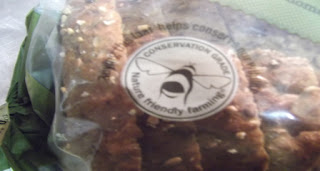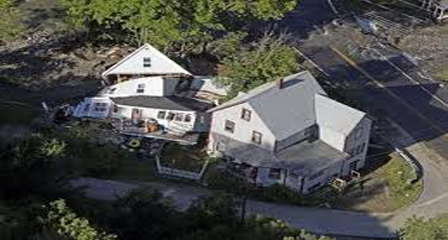Forest Incubators of Life
In Brazil, which houses 30 percent of the remaining tropical rain forest on Earth, more than 50,000 square miles of rain forest were lost to deforestation between 2000 and 2005.
Marine Pollution
The oceans are so vast and deep that until fairly recently, it was widely assumed that no matter how much trash and chemicals humans dumped into them, the effects would be negligible.
Sustainable Palm Oil
Major China-based producers and users of palm oil have committed support for sustainable palm oil.
Carbon Trading Grows 19 per cent
The volume of carbon allowances traded globally grew by almost 20 per cent last year, according to new figures that also show that falling prices meant the value of the market grew by just four per cent.
Mistakes in Fishkeeping
We take a look at some of the biggest mistakes made by fishkeepers – and not just newcomers to the hobby!.
Tuesday, January 17, 2012
EU Airline Emissions Restrictions
Garuda seeks to dodge EU carbon tax scheme
“We actually do not want to pay the ETS because the consequences would be that we would raise our ticket prices,” Garuda Indonesia finance director Elisa Lumbantoruan told The Jakarta Post on Sunday.
It would be financially viable for Garuda, however, to pay such a tax next year, Elisa said.
In addition, the airline’s vice president for corporate communication Pujobroto said that Garuda had reported their emission budget for this year’s Jakarta–Amsterdam route, which connects in Dubai, to the Dutch Ministry of Infrastructure and Environment.
Pujobroto said the airline would receive the final evaluation from the Dutch ministry in December.
“If we emit more carbon than the level allowed, we would pay the tax,” he told the Post.
However, Elisa said that they were optimistic that Garuda would not exceed the carbon cap because their aircraft were environmentally friendly.
Besides, he continued, the EU would only count the carbon emitted on the Dubai to Amsterdam leg of the route, he added.
The EU’s new aircraft emissions scheme came into force on Jan. 1 and the EU said that it would not back down from the new tax despite mounting international pressure to do so.
Several nations, such as China, India and the United States have criticized the new tax.
The ETS is an extension of a 2003 EU carbon trading scheme that covers factories, power plants and other installations. The scheme, which sets a limit on the level of emissions allowed, is a key part of EU’s climate change policy aimed at reducing global warming emissions.
Under the scheme, the facilities that emit more carbon than their prescribed limit will have to buy permits to cover their emissions.
But, if their emissions are less than the allowed limit, they would be allowed to sell spare permits from their emission allowances.
In a separate interview, Transportation Ministry spokesman Bambang Ervan said the Indonesian government was against the carbon emission scheme.
Bambang said that Indonesia was not alone as Transportation Ministries in the Southeast Asian Countries (ASEAN) were on the same page about the new tax system.
“Our decision in the last ASEAN working group last year is that we are against the ETS,” he added.
According to Garuda Indonesia’s official website, the flight to Amsterdam takes off from Jakarta everyday at 8:40 p.m., arriving in Dubai at 2 a.m. The aircraft then departs again at 3:15 a.m., arriving at Amsterdam’s Schiphol airport at 8 a.m.
Elisa said that the ETS did not discourage the airline’s intention to add to its fast growing network over the next four years with new routes to Frankfurt, London, Paris and Rome.
“If the routes are profitable, we will open them,” Elisa said. (nfo)
Monday, January 16, 2012
Climate change skepticism seeps into science classrooms
Although scientific evidence increasingly shows that fossil fuel consumption has caused the climate to change rapidly, the issue has grown so politicized that skepticism of the broad scientific consensus has seeped into classrooms.
Texas and Louisiana have introduced education standards that require educators to teach climate change denial as a valid scientific position. South Dakota and Utah passed resolutions denying climate change. Tennessee and Oklahoma also have introduced legislation to give climate change skeptics a place in the classroom.
In May, a school board in Los Alamitos, Calif., passed a measure, later rescinded, identifying climate science as a controversial topic that required special instructional oversight.
"Any time we have a meeting of 100 teachers, if you ask whether they're running into pushback on teaching climate change, 50 will raise their hands," said Frank Niepold, climate education coordinator for the National Oceanic and Atmospheric Administration, who meets with hundreds of teachers annually. "We ask questions about how sizable it is, and they tell us it is [sizable] and pretty persistent, from many places: your administration, parents, students, even your own family."
Against this backdrop, the National Center for Science Education, an Oakland-based watchdog group that supports the teaching of evolution through advocacy and educational materials, plans to announce on Monday that it will begin an initiative to monitor the teaching of climate science and evaluate the sources of resistance to it.
NCSE, a small, nonpartisan group of scientists, teachers, clergy and concerned individuals, rose to prominence in the last decade defending evolution in the curriculum.
The controversy around "climate change education is where evolution was 20 years ago," said Eugenie Scott, executive director of NCSE.
At that time, evolution — the long-tested scientific theory that varieties of life forms emerged through biological processes like natural selection and mutation — was patchily taught. Teaching standards have been developed since then, but it's unclear how widely evolution is taught, given teachers' fear of controversy.
Studies show that teachers often set aside evolution for fear of a backlash. Scott worries this could happen with climate science too.
"The question is self-censorship and intimidation. What you have to watch for is the 'hecklers' veto,' " she said. "If a teacher ignores a particular topic, it will likely go unnoticed."
Climate change skeptics like James Taylor, environmental policy fellow at the Heartland Institute, a conservative think tank, said the pushback in schools and legislatures reflected public frustration at being told "only one side of the global warming debate — the scientifically controversial theory that humans are creating a global warming crisis."
"It is therefore not surprising that state legislatures are stepping in to ensure that taxpayer dollars are not spent in a manner that turns an important and ongoing scientific debate into a propaganda assault on impressionable students," Taylor said.
Climatologists say man-made climate change is not scientifically controversial.
Instruction on climate change is typically introduced in middle school earth science classes and in recently popular high school environmental science courses, often electives.
In 2007, science teachers said their greatest challenge was making climate change fit in with their curriculum, according to a survey by the Cooperative Institute for Research in Environmental Sciences, a joint project of NOAA and the University of Colorado at Boulder. By 2011, the biggest concern wasn't the curriculum but the controversy, said Susan Buhr, director of the education outreach arm for the institute.
Resistance to the scientific consensus breaks down mostly along regional lines, Buhr said, with greater pushback in the South and in regions where "livelihoods have been built on extractive industries" of fossil fuels.
Attacks on evolution come largely from conservative Christians who believe in a literal reading of the biblical creation story. Climate change denial is mostly rooted in political ideology, with foes decrying it as liberal dogma, teachers say. The NCSE's Scott said that made it much harder to use the courts to protect climate science education.
New national science standards for grades K-12 are due in December. The standards — based on a framework by the National Academy of Sciences and developed by a partnership of private industry and state governments — are expected to include climate change. But some science educators predict that could heat up local and state resistance in some areas.
"You could see more states or localities challenging the topic," said Niepold, who is familiar with the NCSE initiative. "Given the polarized nature of how people take this issue, having a community organization that looks at the issue could be valuable."
Mount Rainier: Missing snowshoer found alive
Wednesday, January 11, 2012
Select Edible Oils
Malaysia’s Palm Oil Stockpiles
Exports of palm, the world’s most-used cooking oil, from Malaysia fell by about 3 percent while production dropped as much as 10 percent, the Hamburg-based researcher said today in a report. Palm oil futures gained 9.3 percent in the last quarter of 2011 on speculation that inventories would decline and unusually high volumes of rain may hurt yields in Malaysia.
Declining stockpiles “supported palm oil prices in recent weeks, coinciding with fears that excessive rainfall may magnify the seasonal decline of palm oil production in Malaysia in the near term,” Oil World said.
Malaysia exported 1.49 million metric tons of palm oil in December versus 1.66 million tons in November and 1.29 million tons in December 2010, Oil World said, citing cargo surveyor SGS. China was the leading destination last month, importing 337,000 tons, Oil World data show. The European Union imported 296,000 tons and Pakistan took in 167,000 tons, the researcher said.
Rainfall in November was about 15 percent above normal for the country, Oil World said. Perak, the fourth-biggest palm oil growing region in the country, received about 134 percent of normal precipitation in November, the researcher said.
mistakes in fishkeeping
In these days of ultra bright lighting you can actually have too much light, and have it on for too long. Your tank only needs light if you grow plants, or corals, and given the choice, your fish would much rather be in the shade.
This is very common with brand new fishkeepers and is a classic schoolboy error. The filter media harbours beneficial bacteria (beneficial because they convert harmful fish waste into less toxic forms,) yet chlorine and chloramine are put into tapwater by water authorities to kill bacteria. So clean your filter media, but clean it in old tank water, and that mucky water makes great feed for your house and garden plants.
You probably thought we'd say overfeeding didn't you – but we see many more underfed, rather than overfed fish on our travels. After speaking to many fish nutrition experts we reckon it is pretty difficult for a goldfish to overfeed itself to death for example, and that the resultant water quality issues from overfeeding and uneaten food are a much more likely cause.
If there is one bit of advice that we feel more important than anything else in fishkeeping, it's to change the water. All owners of the best fish, and best aquariums and ponds in the world all change water very often, even when you or I would think there would be no need to.
When compared with nature, our aquariums and ponds aren't as big as they may seem. Small bodies of water only hold small populations of fish, and only with artificial filtration and aeration can we break the rules of nature and place more fish into a given space than it would naturally allow. The result is a much more colourful, busier, more enjoyable spectacle in our living rooms, but that can also lead to stunted growth, heightened aggression and disease.
Move over some mature filter media (place a Biofoam 45 sponge inside your external filter,) and when you purchase fish, fill the tank with mature tank water, move the sponge over and you have a mature tank. Place a newly purchased fish into the tank (only one species from one batch, from one source at a time,) leave for several weeks and monitor their health. If you lose the fish, they won't take down the fish in your main tank and getting compensation by way of a replacement fish will be a lot more straightforward as that shop's fish will not have mixed with others and hence, cross contaminated.
Whenever you want to buy a fish, you should first test the water of your tank to make sure that water quality is at its optimum. If you have a new tank, you should even test every day for a week before adding fish, just to make sure that there are no spikes. If you place a fish into a tank with failing water quality, you instantly have problems and it will mean stress for you and your new fish. Test water, if it is OK, add fish. If not, don't.
We've all been guilty of this at one point or another. Fish shops are like sweet shops for us addicts, so every now again we spot a tasty looking stripy thing that we just must have.
The problem is that the stripy fish may grow huge, or eat everything, or have requirements that you just can't cater for. Ask an assistant about the fish, tell them what you already have in the tank, and better still take a book or google it on your smart phone.
9. Incorrect use of treatments
We're not fish vets, and neither are 99.99% of the people who keep fish. As mentioned above we cannot spot many ailments and diagnosis can be shaky at best, so if you're not sure, don't just reach for the medication as a matter of course. The more you use a medication, the less effective it will be, and every time you do use one it may knock out some filter bacteria, or weaken a fish.
Find someone who knows about disease, listen to their professional recommendations and dose accordingly. PFK has fish health experts on its panel, some companies have customer advice lines and onboard experts, so use them, and get it right first time. Arm yourself with water quality data, tank stats and a photo of the fish and they will be able to help much more thoroughly.
10. Lack of patience
Fishkeeping is a patient hobby. Plants take time to grow, fish take time to mature and develop adult coloration and finnage, and corals take even longer to grow. These things can't be rushed, and the worse patience related problem is stocking a tank too soon - quicker than the bacteria population can multiply enough to be able to cope.
The weekends are the rush times. You're off work for two days and want to cram everything into that time, including fully stocking a new tank, or putting six months worth of fish additions into six hours. For the sake of your fish, and your sanity, don't do this and as frustrating as it is to just wait, you will save money in medications, test kits and fuel as you frequent the aquatic shop to try and remedy your mistakes.
If you just have to buy something, buy a book or a magazine – or a plant. Don't buy a fish.
Endangered species
The 78m Panamanian-flagged 'MV Tycoon' was being loaded with phosphate fertiliser in Flying Fish Cove when it broke from its mooring on Sunday. The crew were safely evacuated but weather conditions were so bad that it soon broke in half and began to sink.
The Australian Maritime Safety Association has estimated that about 102 tonnes of intermediate fuel oil, 11,000 l. of lubricant oil, 32 tonnes of diesel oil and approximately 260 tonnes of phosphate were on board the vessel and that the majority of this will have been released into the sea.
Australian Maritime Safety Authority's Toby Stone said: "The bad news is that there could be no containment operation because of the very severe swell and weather conditions.
"But, there's a positive side to that; the bad weather has helped to break up and disperse a lot of the oil naturally."
However, Conservation Council of WA environmental science and policy coordinator Nic Dunlop who used to live on the island is concerned that January is a critical time in the biological cycles of many of the species there. Any land crabs returning to shore after spawning will face a coastline contaminated by oils and phosphate. Today has seen some red crabs start to come ashore which is a good sign but he is also worried that the whale sharks may suffer too:
"The whale sharks come to Christmas Island specifically to feed on the land crab larvae and they could be ingesting contaminates in the process of foraging. They are particularly at risk from this event."
A marine casualty coordinator and pollution expert has been brought in to assess the damage but currently everything is on hold until the weather improves. Meanwhile, islanders remain concerned that food supplies may not be able to reach the island and that their tourism may be affected. A number have already offered their help when the clean-up finally gets under way.
Carbon Trading Grows 19 per Cent
Oregon’s Small Farmers Want Subsidies
Conservation Grade Oats
After Storm Destroys in Vermont Dairy Farms
Tuesday, January 10, 2012
Earthquake off the west coast of northern Sumatra
| Magnitude | 7.3 |
|---|---|
| Date-Time |
|
| Location | 2.396°N, 93.175°E |
| Depth | 29.1 km (18.1 miles) |
| Region | OFF THE WEST COAST OF NORTHERN SUMATRA |
| Distances | 423 km (262 miles) SW of Banda Aceh, Sumatra, Indonesia 537 km (333 miles) SW of Lhokseumawe, Sumatra, Indonesia 951 km (590 miles) W of KUALA LUMPUR, Malaysia 1789 km (1111 miles) WNW of JAKARTA, Java, Indonesia |
| Location Uncertainty | horizontal +/- 16.3 km (10.1 miles); depth +/- 8.1 km (5.0 miles) |
| Parameters | NST= 75, Nph= 75, Dmin=504.3 km, Rmss=1.49 sec, Gp= 68°, M-type=regional moment magnitude (Mw), Version=6 |
| Source |
|
| Event ID | usc0007ir5 |
Powerful earthquake hits off coast of Indonesia
Ligneous flora diversity of a submountain forest
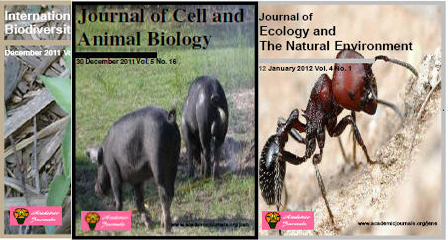 |
| Download the Journal *pdf |
Development tasks supporting scale for fathers
 |
| Download the Journal *pdf |
Abstract
The effect of waste polypropylene fibre inclusion
The effect of waste polypropylene fibre inclusion on the mechanical behaviour of sand generated from the aggregate industry Choura .M 1,2*, Khelif .N 2, Mnif .T 2 and Menaa .L3 1National School of Engineers (ENIS), University of Sfax, Tunisia. 2Research Unit, Environmental Geotechniques and Civil Materials, ENIS, Sfax, Tunisia. 3University of Medea, Algeria. *Corresponding author. E-mail: chouramed@gmail.com. Accepted 8 November, 2011 | ||
Abstract | ||
During the last decades, the rising demand for land reclamation and the utilization of soft or unstable soils led to a great advance in the ground amelioration techniques as a major part of civil engineering around the world. Within this framework, this paper presents the results of an experimental program based mainly on direct shear tests on sand generated from aggregate industry, with and without waste polypropylene (PP) fibre reinforcement, in order to assess the effect of randomly distributed PP fibre on the stress displacement behaviour and shearing strength of this type of sand. The effects of the variation of PP fibre content (limited to 1.5% of the weight of sand) and length (0.5, 1 and 1.5 cm) are investigated. The obtained test results indicate that PP fibre reinforcement increases the maximum shear constraint and changes the sands brittle mechanical behaviour into a more ductile one. These results pave the way to an effective valorisation of such a traditionally useless kind of sand. Key words: Polypropylene fibres, fibre-reinforced sand, shearing strength, mechanical behaviour. |
Monday, January 9, 2012
Mathematical modeling on tomato plants: A review
C. A. Medina-Ruíz, I. A. Mercado-Luna, G. M. Soto-Zarazúa and I. Torres-Pacheco and E. Rico-García* Department of Biosystems, School of Engineering, Queretaro State University, C.U. Cerro de las Campanas, Querétaro, México. *Corresponding author. E-mail: ricog@uaq.mx or garciarico@yahoo.com.mx. Tel: (52) (442) 1921200 ext. 6016. Fax: (52) (442) 1921200. Ext: 6015. Accepted 31October, 2011 | ||
Abstract | ||
Mathematical models allow for predictions of behavior under specific handling and environmental conditions, and are particularly useful in expensive studies or in studies where long term effects may be difficult to monitor. In mathematical modeling there are two main types of models: descriptive models and mechanistic models; the first are relationships between response and predictor which are not ruled by biological processes; the latter takes into account the basic processes in plants by means of differential equations to account for the development of plants. This requires a deeper knowledge of the physiological development of plants. This work reviews mathematical modeling on tomato plant. The TOMGRO model is modular and has been widely studied and calibrated under several climatic conditions which demonstrates that it is a robust model. As a future research the TOMGRO model is proposed to be adapted to other crops. Key words: Differential equations, descriptive models, mechanistic models. |
Organic Philosophy
Sustainable Palm Oil












